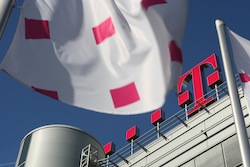It is “vital” Europe plays a central role in the development of 5G, Deutsche Telekom has said, as another special interest group exploring the sector was launched.
Claudia Nemat, the German operator’s board member responsible for Europe and Technology, said 5G is set to be one of the key areas explored at next month’s Mobile World Congress.
There is disagreement around when the first global standards will be issued, with Huawei pushing for 2016 or 2017 and others arguing 2020 is a more likely date. Nemat said: “But whether or not the industry meets these deadlines spot-on, we as Deutsche Telekom and Europeans are involved. We are doing our part to shape the new standard; we are right at the forefront of NGMN and we are powering ahead. In Barcelona, this alliance will present its 5G white paper, the industry’s consolidated view of the end-to-end requirements for mobile network access.”
Organisations such as 5G-PPP have been exploring the potential of the technology and bringing together players from different parts of the industry.
Meanwhile, the President of the IPv6 Forum has launched a new 5G World Alliance organisation, which he said was aiming to establish seamless global network interoperability.
Latif Ladid, who has also been a 3GPP project coordination group board member since 1999, said: “5G is so much more than the next generation of mobile technology; it is the next generation of how the world – and everyone and everything in it – communicates from around 2020. The 5G World Alliance will be a focal point for organisations with the expertise and the desire to transform a world already hungry for the latest solutions and applications.
“We are talking here about a 5G World where technologies such as an all-IPv6-based M2M, the mobile IoT, mobile cloud computing, SDN, NFV, fringe and tactile internet will converge over fixed and mobile networks to change lives and businesses everywhere.”
Ladid said the alliance was currently establishing board members and said it would work alongside the ETSI IPv6 ISG to share findings of new types of technology.
Elsewhere in her predictions for MWC, Deutsche Telekom’s Nemat said eSIM and the integration of mobile and fixed. She said Apple’s demands to have SIM cards built into devices gives the industry an opportunity to develop an open eSIM standard.
The predicted growth in the wearables sector, along with M2M, means a new method of delivering connectivity will be required.
Nemat said: “Everything will be connected, but many devices simply aren’t suited to carry SIM cards built the way they are today. And if we are all going to have five or 10 such wearables in the future, then the simplest thing will be to have on contract with a single service environment that users can activate on all their devices with just one click.”
Finally she said creating a pan-European IP network was crucial for the operator’s long-term future. “The way things are now, every technical innovation has to be introduced separately in each European country,” she said. “That creates an enormous expense, since each country’s network technology works differently. In the future, innovations could be rolled out to the network overnight across most of Europe. This adds a whole new dimension to the single market.”
Nemat said Europe needed to be able to compete on a level playing field with Asia and North America. She added: “Otherwise, our only place in this global competition will be as a location for others to sell their services. With zero innovative power of our own. But Europe can keep pace and shape its strategic action areas, when we overcome barriers, break down silos, and emphasise the use of open platforms and standards.”
Read more:



